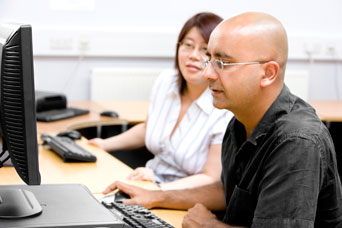Use 'Print preview' to check the number of pages and printer settings.
Print functionality varies between browsers.
Printable page generated Saturday, 28 February 2026, 5:06 AM
Introduction
Why might this reflection course be useful to me?

When we look in the mirror we see our reflection. In everyday life we sometimes talk about being in a ‘reflective mood’, and we tend to reflect on things that don’t have an obvious or straightforward answer. We might take time to reflect on something to consider it in more detail, in greater depth and in a new way. Consciously or unconsciously, reflection involves our thoughts, ideas, experience and knowledge, and the process of reflecting might be pleasurable or uncomfortable, or a mixture of both. Generally, reflection is a way of working on what we know already and it generates new knowledge.
We can experience change in our lives through our own choice, or we may find change is forced upon us. The process of self-reflection is something that we can undertake at any time in our lives to help us examine our feelings around a whole range of experiences. It can also help us to examine our goals, decision making or motivations – and for that reason, it is also used in learning and work contexts, and in relation to personal development and career planning. Reflection can help us to recognise and appreciate skills, abilities and qualities that we have and often overlook.
The aim of this course is to get you started on thinking about yourself, who you are, where you are now, what you want to do in your present situation and how you can work towards doing what it is you want.
The course and the activities within it are presented from the perspective of learners who may be new migrants, refugees or asylum seekers. But we hope that whatever your personal perspective, you’ll find this course useful in reflecting on experiences that have some importance to you, and that it will help you with future choices or decision making.
Similarly, if you have a role as a support worker, Reflecting on Transitions offers an opportunity to assess your knowledge and understanding of the issues affecting new migrants, refugees and asylum seekers.
Learning outcomes
By working through Reflecting on Transitions you’ll achieve:
- an understanding of the strengths, qualities and skills gained by new migrants, refugees and asylum seekers during periods of transition
- a clearer understanding of the experiences that learners could have reflected on, including their roles, actions and decisions
- an idea of what direction learners might like to go in now
- an idea of how to find out what is possible for learners to achieve in the immediate future
- the ability to use information technology (IT) to carry out simple activities in writing and communicating
- the ability to use the internet to find information useful to learners
- the ability to use new ways of expressing ideas.
We hope that you’ll find this course useful in reflecting on experiences that have some importance to you, and that it will help you with future choices or decision making.
What’s in the course and how do I use it?

Reflecting on Transitions contains a mixture of personal reflection, ideas about how we learn from reflection and activities for you to try out for yourself.
It features case studies of four people who have moved to a different country for different reasons. These case studies highlight a range of personal journeys and explore the circumstances and issues that have affected the real life choices of the four people featured: Natalia, Eric, Ying and Mo.
There are five sessions within the course that include a range of activities to help you reflect on the following:
- Session 1: Defining myself and how I feel about my present situation
- Session 2: Learning by looking at my life over time
- Session 3: Identifying my skills, qualities and abilities
- Session 4: Clarifying my goals and planning for the future
- Session 5: Identifying my next steps and where I can find information and support
In each of the five sessions you will be invited to relate your own experiences to the ones illustrated and try out the individual tasks. Each section will take you about an hour to complete.
If English is not your first language, there are resources within the course to help you. These include a glossary of technical or specialist words and phrases, and links to resources such as Am I ready to study in English? (EAL_1). Further information is given in the list of useful websites in the Resources section of this course.
My Reflection Log
You can complete the activities in a couple of ways:
- As you work through Reflecting on Transitions, you can simply click on the downloadable resources that we have provided.
- Use My Reflection Log, a personal resource that collates of your progress through the course as you undertake the various activities and tasks. You can add further notes and observations to this at any time. When you have completed the reflection course we hope that this Log will be a useful reference source and basis for your planned next steps in life, study or career.
My Reflection Log is designed to be downloaded and saved to your computer or memory stick. You may find it helpful to download and save a copy onto your laptop or memory stick now. It can then be opened and added to as required – but don’t forget to save it every time you use it. Alternatively, if you prefer, you can print out the Log and use it to write down your thoughts.
Whichever option you choose, you will find it helpful to make notes (either in your Reflection Log or in a notebook) as you work through the course.
Optional course quizzes
At the end of each session is a quiz that asks you a few questions based on the themes addressed in this part of the course. The Reflecting on Transitions quizzes can only be undertaken online by enrolling on this free course. To enrol you’ll need to open an Open University account.
- If you already have an account, just click on ‘Sign in to enrol’ and enter your user name and password. If you don’t have an account, create your new account here.
- Follow the instructions, and once you have finished registration by reaching the My Account page simply close the browser window or tab.
- Then refresh THIS page to update your status so you can enrol.
The quizzes are entirely optional but they are fun to do and can really help to consolidate your learning, reflection and understanding of the material.
You can complete the quizzes and work towards gaining your Reflecting on Transitions digital badge.
Digital badges are a new way of demonstrating online that you have gained a skill. Schools, colleges and universities are working with employers and other organisations to develop open badges that help learners gain recognition for their skills, and support employers to identify the right candidate for a job.
If you are interested in finding out more about digital badges go to the Badges and quizzes guide.
The Reflecting on Transitions badges
While studying Reflecting on Transitions you have the option to work towards gaining a digital badge.
There are two Reflecting on Transitions badges available:
 The purple badge is appropriate if you are a new migrant, refugee or asylum seeker where the learning outcomes refer to your reflections on your roles as well as what you have learned from the course and life experiences.
The purple badge is appropriate if you are a new migrant, refugee or asylum seeker where the learning outcomes refer to your reflections on your roles as well as what you have learned from the course and life experiences.
 The crimson badge is appropriate if you work alongside or have a role in supporting new migrants, refugees and asylum seekers. Here the learning outcomes refer to your knowledge and understanding of the experiences of new migrants, refugees and asylum seekers as referred to in the course.
The crimson badge is appropriate if you work alongside or have a role in supporting new migrants, refugees and asylum seekers. Here the learning outcomes refer to your knowledge and understanding of the experiences of new migrants, refugees and asylum seekers as referred to in the course.
You just need to ensure you choose the appropriate badge trust statement for the badge you wish to gain.
Depending on your personal circumstances and roles, some of you may wish to gain both badges, particularly if you gained a badge as a learner and then moved on to supporting new arrivals to the UK. In these circumstances you may want to gain recognition of your understanding of others’ experiences of reflecting on their transitions. To do this, click on both badge trust statements. You then only have to read the course and attempt each quiz once.
The Reflecting on Transitions badges show that you have gained an understanding of the process of reflection and personal planning, and that you have achieved the learning outcomes listed within the course.
Course completion criteria
To gain your Reflecting on Transitions course badge you need to have enrolled on the course and completed the course criteria listed below:
- Agree to the badge trust statement
- Read each session
- Attempt quiz 1
- Achieve 40% for quizzes 2–5.
You don’t need to read the full session and complete all the questions in a quiz in one sitting. Each time you log into the course it keeps a record of your progress. This means you can stop and come back to where you left off at any time.
Once you’ve completed all the questions in a quiz to the best of your ability it’s time to submit your answers. You can only do this once for quizzes 2–5, so make sure you’re happy with how you’ve answered all the questions before you click on ‘submit all and finish’.
When you have successfully completed the course badge criteria, you will see the ‘badge’ within your profile under My badges on OpenLearn Works. You will be able to display your Reflecting on Transitions badge in other online places too.
Badge trust statement
The OpenLearn Works non-accredited badging system relies on trust. We trust you to answer the questions at the end of each session in the course drawing on your own skills and knowledge, as we do not have formal exams or invigilation as part of OpenLearn Works units and courses. The badge trust statement asks you to agree that the answers you submit to the course quizzes are your own work and that you will not share your answers with other learners.
There is more guidance on How to complete the course quizzes and How your Reflecting on Transitions badge is issued in the Badges and quizzes section in the Resources area of the website.
Using the course

There is a range of ways in which this course can be used. For example, you can work through these activities on your own or with a mentor, or in a group with a facilitator. If you are working in a face-to-face group, for instance, you might work on one session at a time over a number of weeks. You can also share your comments and ideas with others online, through Facebook for example.
A statement about confidentiality
When people reflect together, in a group, this can make it easier to discuss things, and you can get ideas from each other. But members of the group need to have confidence in each other and need to be committed to respecting each other’s ideas, beliefs and experiences. They must agree to do this and also not to discuss outside the group anything that group members say. No member of the group ever needs to discuss anything that they do not want to talk about. Each one decides what they want to contribute.
If you are working through this course in a group, either online or face to face, take some time now to agree with your group the rules you will follow to respect each other and ensure confidentiality.
Session 1: Defining myself and how I feel about my present situation
Acknowledgements
Reflecting on Transitions was developed by Lindsay Hewitt and Christine McConnell of The Open University in Scotland in collaboration with Bridges Programmes. The optional quizzes for the related digital course badges for learners and support workers, respectively, were developed by Julie Robson (The Open University) and Jonathan Sharp (Bridges Programmes). The course was edited by Lindsay Hewitt and Jennifer Nockles (The Open University).
We are hugely grateful to Bridges’ clients, Mo, Ying, Eric and Natalia, whose stories have informed the development of this course and bring to life the activities within it. We hope you find something in their experiences that speaks to you as well.
Thanks also to The Scottish Qualifications Authority, bubbl.us, the National Careers Service (Directgov) and TagCrowd.
Except for third party materials and otherwise stated (see terms and conditions), this content is made available under a Creative Commons Attribution-NonCommercial-ShareAlike 4.0 Licence.
The material acknowledged below is Proprietary and used under licence (not subject to Creative Commons Licence). Grateful acknowledgement is made to the following sources for permission to reproduce material in this unit:
Unit image: flickr.com/Adeline Suvdal. All images: © iStockphoto.com
Images
Figure 1: © Globalstock/iStockphoto.com
Figure 2: © iStockphoto.com
Figure 3: © iStockphoto.com
Every effort has been made to contact copyright owners. If any have been inadvertently overlooked, the publishers will be pleased to make the necessary arrangements at the first opportunity.
Don’t miss out:
1. Join over 200,000 students, currently studying with The Open University – http://www.open.ac.uk/ choose/ ou/ open-content
2. Enjoyed this? Find out more about this topic or browse all our free course materials on OpenLearn – http://www.open.edu/ openlearn/
3. Outside the UK? We have students in over a hundred countries studying online qualifications – http://www.openuniversity.edu/ – including an MBA at our triple accredited Business School.